Share
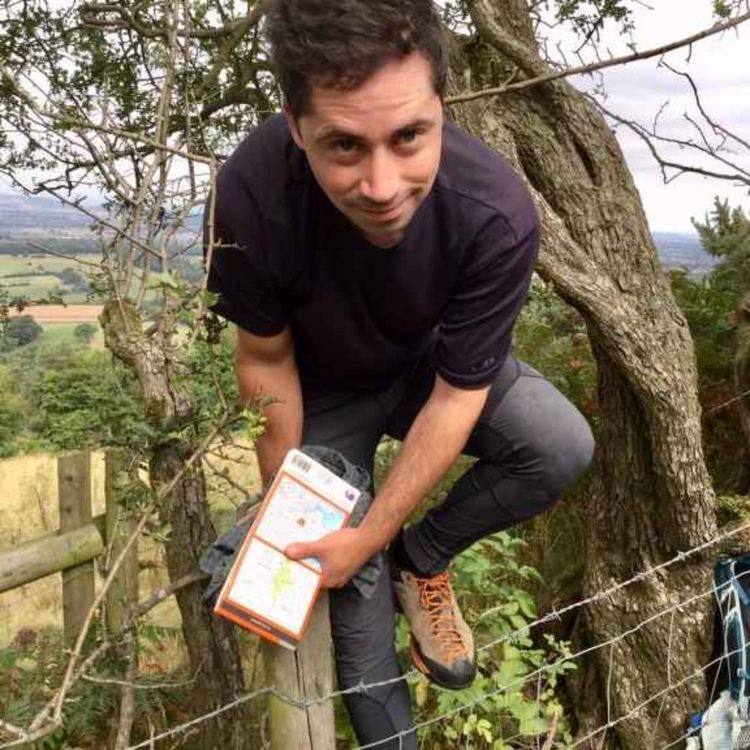
The Adventure Podcast
Episode 125: Jon Moses, How to Trespass, and Why You Should
Ep. 125
•
In this dispatch episode, Matt chats with Jon Moses; a writer with a PHD in geohumanities, and a campaigner for Right to Roam. We discuss the issues regarding access to wild space in the UK and why that needs to change. We also talk about civil trespass, what it is, how to do it, and why you should.
More episodes
View all episodes
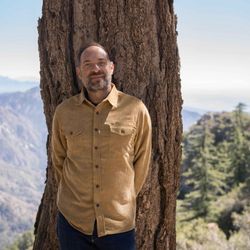
221. Episode 221: Adam Skolnick, American Tiger
01:04:29||Ep. 221Episode 221 of The Adventure Podcast features international journalist and author, Adam Skolnick. Adam has written for countless news outlets, Lonely Planet guidebooks, magazines, and columns, and has travelled to over 40 countries. In this episode, Matt and Adam discuss his journey into writing. His first gigs, travelling for stories, and how to make a living doing so. Adam reflects about the early adventures he went on; cycling around the world in his twenties and how the reality looked very different from the romantic version he imagined. Often including long-stretches of boredom, loneliness and self-doubt. It's a wide-ranging conversation as they discuss everything from the pressure of shaping messy reality into something coherent on page, to ego and validation, the discomfort of being honest about motivations that don’t fit the heroic narrative, and the temptation to chase ever-bigger projects for 'better' stories. Adam also talks about the inspiration behind his new book, American Tiger, which he covered live as a journalist at the time, and how he found transitioning from fact to fiction.For extra insights from the worlds of adventure, exploration and the natural world, you can find The Adventure Podcast+ community on Substack. You can also follow along and join in on Instagram @theadventurepodcast.Chapter Breakdown00:00-05:00: Motivations, ego, and the difference between starting an adventure and finishing one.05:00-12:00: Adam reflects on riding around the globe, and the uncomfortable truth about why he really left.12:00-25:00: A raw account of failure at sea, coping in crisis, and how unfinished journeys shape us differently.25:00-35:00: Why success can be less interesting than failure, and how chasing “epic” creates a moving goalpost.35:00-45:00: Different ways people experience fear, and why acknowledging it can be more powerful than suppressing it.45:00-55:00: How children, responsibility, and time away from crisis culture reframed Adam’s sense of purpose.55:00-01:05:00: Adam introduces a new philosophy: joy over grit, presence over performance.01:05:00-01:20:00: Why “hero moments” lose value over time, and what actually lasts from a life of adventure.01:20:00-End: Closing reflections on peace, humility, and finding meaning without needing the next big thing.To listen to new podcast, Atlantic Canada, head to https://podcasts.apple.com/us/podcast/atlantic-canada/id1872073512, or search it wherever you get your podcasts.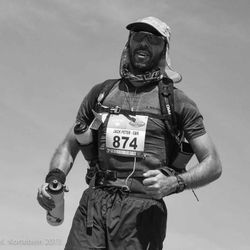
220. Episode 220: Peter Wright, A Mid-Life Less Ordinary
01:03:25||Ep. 220Episode 220 of The Adventure Podcast features endurance athlete and author, Peter Wright. Peter has undertaken some of the world's most challenging endurance events - completing the Marathon des Sables, the Jungle Ultra, the Western States 100, the Cape Wrath Ultra and rowing the Atlantic. But what's fascinating about Peter is that on the face of it, he's a pretty normal bloke with a full-time career, who made a series of seemingly ordinary decisions. In this episode, Matt speaks with Peter about how a comfortable, “mildly active” life gradually evolved into a decade of endurance challenges. He shares honest stories of failure, imposter syndrome, DNFs, and the mindset shifts that helped him keep going when quitting felt easier. They discuss balancing adventure with family life and a full-time career, the reality of preparing for a two-year project, and the emotional highs and lows of life at sea. At its core, this episode explores motivation, ageing, and fear of regret. And why adventure isn’t necessarily about talent, but about turning up and committing to the long game.For extra insights from the worlds of adventure, exploration and the natural world, you can find The Adventure Podcast+ community on Substack. You can also follow along and join in on Instagram @theadventurepodcast.Chapter Breakdown00:00-03:00: Peter describes his early relationship with sport, comfort, and routine - and the quiet feeling that something needed to change.03:00-06:30: Moving to Jersey, being inspired by an active island culture, and setting the goal of running the London Marathon.06:30-10:00: Discovering ultra running through magazines, meeting influential runners, and saying yes to scarier challenges.10:00-14:00: A disastrous London Marathon; twisted ankle, lost gels and an emergency toilet stop.14:00-18:30: Preparing for the Sahara, imposter syndrome, conservative early pacing, and finishing stronger than expected.18:30-23:00: Why DNFs aren’t the end, unfinished business, and returning to races to “wipe them from the record.”23:00-27:30: Juggling endurance challenges with life.27:30-31:30: Why ultrarunning is more inclusive than expected.31:30-34:30: Sunrises, hallucinations, emotional swings, and the mental landscapes of endurance events.34:30-36:30: A gruelling virtual challenge during Covid leads to an unexpected invitation: rowing the Atlantic.36:30-42:00: Family conversations, finances, sponsorship, learning to row, and two years of preparation.42:00-45:30: Departure day emotions, family goodbyes, and the relief of finally being at sea.45:30-52:30: Peter explains life at sea.52:30-55:30: Reaching Antigua.55:30-59:30: Writing a book, recent multi-day Iron-distance challenges, and redefining what’s possible later in life.59:30-End: Peter reflects on motivation, fear of regret, and why showing up with a good attitude matters more than anything else.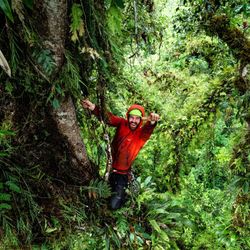
220. Dispatch: Waldo Etherington, Trees
19:07||Ep. 220Dispatches are our shorter form episodes, usually around a single question, subject or story. In this episode, Waldo Etherington talks to us about all things trees. Waldo has been on the podcast before, and is also a regular diarist in our sister series, Field Diaries. He's a rope access specialist whose spent months high in rainforest canopies and on expeditions all over the world. His passion for the lungs of the earth is unparalleled and completely infectious. He explains how exactly he sees trees, from their body language to 'visual tree assessments', and drops mind-boggling facts throughout. Hopefully you'll listen to this episode and walk away with a new sense of wonder and appreciation for these magnificent living beings.For extra insights from the worlds of adventure, exploration and the natural world, you can find The Adventure Podcast+ community on Substack. You can also follow along and join in on Instagram @theadventurepodcast.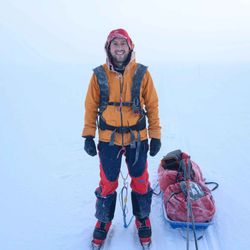
219. Episode 219: Ash Routen, The State of Exploration
01:15:02||Ep. 219Episode 219 of The Adventure Podcast features adventure journalist and research scientist, Ash Routen. Ash has written for Explorers Web, Nat Geo, Outside, The Guardian, Sidetracked, Red Bull, and UKC, among many others. This episode is a thoughtful and refreshingly critical debate of sorts. Matt and Ash dive into the evolving world of adventure to ask difficult questions about the expeditions of today. What still counts as pioneering? What has become routine? How should adventure be reported and celebrated in an era where almost anyone can step into the outdoors? They explore the complexity of modern expedition culture, from Everest tourism to ocean rowing, from ethnicity and gender representation to the role of guiding and commercialisation. They tackle the tension between personal achievement and genuine exploration, reflect on how the public engages with stories of risk, endurance and “firsts", and most importantly, discuss why critical voices are needed in adventure journalism. They also shine a light on some lesser known adventures and adventurers. Its a deep dive into ethics, meaning, media, and what progress looks like.For extra insights from the worlds of adventure, exploration and the natural world, you can find The Adventure Podcast+ community on Substack. You can also follow along and join in on Instagram @theadventurepodcast.Chapter Breakdown:Matt sets the scene inside the Expedition Reports Room and explains why he has wanted to interview Ash for years.Ash outlines why adventure is flourishing publicly, yet diluted at the cutting edge.They discuss why criticism isn’t about tearing people down, but about clarity around what moves adventure forward.Ash argues that adventure lacks critical analysis compared to politics and sport, and explains why objectivity is essential.A deep look at decolonising adventure: class, ethnicity, gender, and why equal reporting isn’t always the same as equal achievement.Matt and Ash explore why some achievements gain headlines while more technical, groundbreaking climbs go unnoticed.Ash describes his criteria for covering expeditions: difficulty, remoteness, logistics, and why lesser-known stories matter.Why feats like Everest climbs or Atlantic rows no longer awe the way they once did.Matt questions the value of guided “fast-track” climbing and why apprenticeship and experience still matter.Ash reflects on climbing heroes, style, and the emotional contrast between historic firsts and today’s model of adventure.A discussion on media digestion- why technical nuance gets lost and why bold headlines win.Ash and Matt unpack how accidents and viral stories distort public understanding of adventure culture.They discuss responsibility, storytelling, and how the community can protect authenticity moving forward.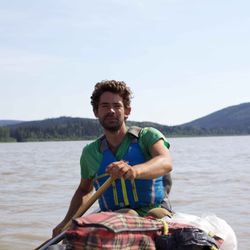
218. Episode 218: Adam Weymouth, Lone Wolf
01:14:30||Ep. 218Episode 218 of The Adventure Podcast features writer, journalist, and adventurer, Adam Weymouth. Over a decade ago, Adam undertook a year-long journey, walking from England to Istanbul. What grew out of burnout from frontline climate activism became a personal experiment in pilgrimage, slowness, and meaning. Adam talks about canoeing the length of the Yukon River while following the salmon run, and walking across the Alps in the footsteps of a lone wolf whose thousand-mile journey helped repopulate parts of Europe. Together with Matt, he explores his earlier years as an environmental activist, including arrests, a high-profile trial, and the emotional toll of sustained direct action. And how it pushed Adam to search for new ways of communicating environmental stories. This is a conversation about walking away from the noise. Slow travel, pilgrimage, storytelling, and how adventure can create empathy rather than spectacle.For extra insights from the worlds of adventure, exploration and the natural world, you can find The Adventure Podcast+ community on Substack. You can also follow along and join in on Instagram @theadventurepodcast.Photo credit: Ulli MattssonChapter Breakdown00:00 - 01:00: Adam reflects on freedom, curiosity, and the privilege of pursuing big questions through journeys.01:00 - 03:00: Adam’s childhood love of writing, environmental awareness, and early pull towards activism.03:00 - 07:30: Protests, arrests, climate camps, and the long legal battle.07:30 -10:30: Why direct action stopped feeling sustainable, and the realisation that storytelling might reach people in a different way.10:30 - 17:00: The origins of Adam’s year-long walk from England to Istanbul.17:00 - 24:00: What pilgrimage offers that ordinary travel doesn’t.24:00 - 27:30: Why fast travel is the historical anomaly, and what is lost when movement becomes frictionless.27:30 - 30:30: Canoeing the Yukon to explore ecological collapse through human stories and lived experience.30:30 - 33:30: Adam explains his fascination with wolves and how one animal’s journey opened wider conversations about fear, politics, and coexistence.33:30 - 37:30: The remarkable thousand-mile journey of a wolf that helped re-establish packs across Europe.37:30 - 41:30: Why rewilding is deeply contested, how it’s been poorly communicated, and why nuance matters.41:30 - 45:30: How arriving on foot changes conversations, builds trust, and creates space for hospitality and honesty.45:30 - 49:30: Why Adam chooses to include himself in his writing.49:30 - End: Reflections on openness, chance encounters, and why adventure is often about how we move through the world, not how far.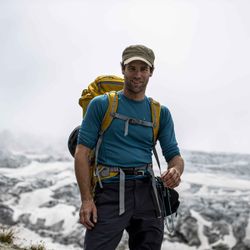
217. Episode 217: Ben Tibbetts, Long Projects in Quiet Places
01:02:33||Ep. 217Episode 217 of The Adventure Podcast features photographer, IFMGA guide, writer and artist, Ben Tibbetts. In this episode, Matt sits down with Ben to explore a life shaped by isolation, long-term creative projects, and a deep need for structure in the wild. The conversation begins with Ben’s 18 months living and working in Antarctica, which quietly rewired how he thinks about solitude, landscape, and meaning. That experience sparked an enduring obsession with small huts in remote places, and ultimately led to years-long projects photographing bivouac huts and high mountain environments across the Alps. Ben also explains why he needs projects, the discipline behind producing large-format books, the thousands of hours of unseen work, and why these projects make little financial sense but enormous personal sense.They touch on modern creativity, the 'junk food' nature of clickbait content, changing industry, and the quiet rebellion of stepping away to make work that lasts. Depth over noise. A meaningful life one long project at a time.For extra insights from the worlds of adventure, exploration and the natural world, you can find The Adventure Podcast+ community on Substack. You can also follow along and join in on Instagram @theadventurepodcast.Chapter Breakdown00:00 - 01:30: Ben reflects on spending 18 months in Antarctica, the psychological effects of extreme isolation, and how that experience planted the seed for his fascination with tiny huts in wild places.01:30 - 09:00: Back to his beginnings - exploring whether creativity or mountains came first, and how a fine art background shaped his photographic eye.09:00 - 26:30: A deep dive into Ben’s approach to photography, mastery of light and colour, and how understanding his artistic roots reframes his mountain work.26:30 - 34:00: Why huts are not destinations but “scaffolding for journeys.”34:00 - 40:30: Ben opens up about using long-term projects to maintain mental health, purpose, and motivation - and why structure is essential for him to function creatively.40:30 - 45:30: They discuss why Ben prioritises books over guiding or brand work, despite the financial reality.45:30 - 52:30: A candid conversation about social media addiction and clickbait culture.52:30 - 59:30: They explore the challenges facing photographers and filmmakers today.59:30 - 01:06:30: A broader reflection on reinvention, relevance, and why diversification is now essential for survival in creative careers.01:06:30 - 01:12:00: The episode closes with reflections on passion, privilege, persistence, and why doing work for the right reasons, even selfish ones, often leads somewhere meaningful.
216. Episode 216: Charlie Reynolds, Pirate Stuff (Part Two)
01:17:14||Ep. 216Episode 216 of The Adventure Podcast is Part Two of the conversation with Charlie Reynolds. If you've not listened to the first half, go back to episode 215. We start this episode where we left off, on a canoe in the waves after a brutal storm. Matt and Charlie continue unpacking his extraordinary journey, and several near misses, through South America. They dig into what those moments taught Charlie about instinct, trust, risk, and why some of his most meaningful insights came from silence rather than adrenaline. Charlie speaks openly about the emotional crash that followed his expedition. The hollow feeling of coming home, how identity becomes intertwined with extreme experiences, and why the aftermath can sometimes be the hardest to navigate. It's an episode packed full of adventure - from crossing an abandoned railway bridge with a no-fall zone, to accidentally befriending illegal gold miners, being robbed at knifepoint while camped in the mountains, and spending hours stuck in volcanic mud between two enormous Ecuadorian volcanoes - its a ride and a half. If Part 1 was about the catalyst that launched him, Part 2 is the proof that once Charlie started chasing uncertainty, the world kept handing him more.Chapter Breakdown00:00:00-00:05:00: Charlie arrives exhausted in Bogotá, sleeps for days, and rebuilds his bike setup before launching into the second half of the journey.00:12:50-00:15:25: He describes arriving in Colombia soaked, gear ruined.00:22:07-00:24:50: Charlie tells Matt about riding across a terrifying abandoned railway viaduct - narrow, unsupported, rattling, and suspended high above a Colombian river.00:31:04-00:33:51: He recounts being approached by armed miners who ended up asking for drone shots, following him on Instagram, and turning what could have been a dangerous situation into a strangely wholesome encounter.00:34:14-00:36:35: Riding south, he meets Diego, who gives him a list of spicy routes, including one that would become one of his biggest “struggle-fests” of the whole expedition.00:36:35-00:38:35: Charlie explains the notorious volcanic mud route.00:40:15-00:42:33: He describes camping in freezing marshland beneath Chimborazo, eating frozen tuna-rice for breakfast, and spending hours trying to haul his 200kg bike up a slope.00:46:04-00:48:28: With an injured leg and almost no energy, Charlie sends a single InReach message home.00:49:52-00:52:14: He recounts being robbed by men who spent hours at his tent demanding money.00:59:38-01:01:32: A detour with a friend ends in them burying a rental car deep in a canyon01:07:16-01:08:24: As he reaches southern South America, the adventure becomes less intense, but not less meaningful.01:08:42-01:11:47: Worried about losing momentum and returning to rent-paying normality, Charlie impulsively buys an old expedition truck in Quebec and limps it across North America with almost no money.01:11:47-End; Charlie reflects on how the journey has rewired him.For extra insights from the worlds of adventure, exploration and the natural world, you can find The Adventure Podcast+ community on Substack. You can also follow along and join in on Instagram @theadventurepodcast.
215. Episode 215: Charlie Reynolds, Pirate Stuff (Part One)
59:04||Ep. 215Episode 215 of The Adventure Podcast features adventurer and overland explorer, Charlie Reynolds. In 2024, Charlie left the UK with almost no experience and rode a motorbike the length of North and Central America. He then attempted something far more daring. The Darién Gap is one of the most dangerous jungles on Earth and represents a frontier very few people attempt. Charlie decided to cross it by a hand-built boat. In this episode, Matt and Charlie explore the catalysts behind his journey, a confrontation with mortality, a hunger for discomfort, and what exactly happened on that trip. Fuelled by equal parts curiosity and chaos. This is only Part One, but it already feels like the start of a legend. There's a whole load more wild stories to follow in Part Two.For extra insights from the worlds of adventure, exploration and the natural world, you can find The Adventure Podcast+ community on Substack. You can also follow along and join in on Instagram @theadventurepodcast.Chapter Breakdown00:00 - 00:06: Introductions and early reflections. What drives someone to step into the unknown?00:06 - 00:09: Charlie breaks down what the Darién Gap actually is, and why nobody is 'supposed' to go there.00:09 - 00:13: The mindset shift. Chasing discomfort to feel alive.00:32 - 00:34: The Catalyst, facing mortality, and deciding to leave the UK.00:38 - 00:40: Riding south through the US, learning logistics the hard way, and finding rhythm in chaos.00:48 - 00:51: Arriving in Panama and negotiating for a dugout canoe in a language he barely speaks.00:54 - 00:56: Steep learning curves, wind, reefs, survival and pride.00:56 - 00:58: The reality of solitude, risk and responsibility - and dolphins guiding his boat.00:58 - 01:00: He realises people already know he's coming. A mystery takes shape.01:00 - 01:03: A surreal moment; Charlie is asked to speak at the funeral of a man he never met.01:03 - 01:05: Maybe this is what he came looking for all along.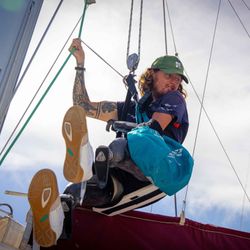
214. Episode 214: Craig Wood, Content
01:17:51||Ep. 214This episode is available for subscribers to watch in vision on The Adventure Podcast+ substack.Episode 214 of The Adventure Podcast features solo sailor and triple amputee, Craig Wood. Craig's life changed at 18 years old when, three months into his first military tour, he lost both legs and his left hand in an explosion in Afghanistan. It took eight months for him to learn to walk again. He recently made history by becoming the world’s first triple amputee to sail solo, nonstop and unsupported across the Pacific Ocean. In this episode, Craig talks to Matt about trauma, radical acceptance, and the pursuit of contentment instead of happiness. They unpack how Craig rebuilt his life through Paralympic sailing, discovered peace living aboard a boat with his young family, and learned to find meaning in waiting, patience, and purpose. For extra insights from the worlds of adventure, exploration and the natural world, you can find The Adventure Podcast+ community on Substack. You can also follow along and join in on Instagram @theadventurepodcast.Chapter Breakdown00:00 - Craig recalls the explosion in 2009 that left him a triple amputee, his surreal coma hallucinations, and the first moments of realising life would never be the same.07:00 - A powerful turning point: Craig’s mother challenges him to take action rather than despair. He begins the long road of rehab, learning independence and resilience.10:00 - Introduced to Paralympic sailing while in recovery, Craig rediscovers competition, identity, and hope - leading him to represent his country and dream of open water.13:00 - After Paralympic sailing is cut from the Games, Craig pivots, buying his own boat and setting his sights on the ocean.16:00 - Matt and Craig dive into what it’s really like to live aboard with his wife and two small children; balancing risk, love, and the constant hum of adventure.23:00 - Craig recounts his 7,500-mile solo voyage from Mexico to Japan; the storms, the stillness, the pizza-making, and the lessons in solitude and self-sufficiency.33:00 - They discuss how society defines disability, the importance of trying over assuming limits, and how Craig’s story challenges ideas of what’s possible.45:00 - Craig opens up about raising £68,000 for veterans’ charities, finding meaning in contribution, and sailing not just for himself but for others.53:00 - Reflections on fatherhood, partnership, and what true contentment means; the quiet power of being “okay” rather than endlessly chasing happiness.59:00 - Craig and Matt wrap up on how adventure can rebuild a life - not through escape, but through deep engagement with the world, family, and self.